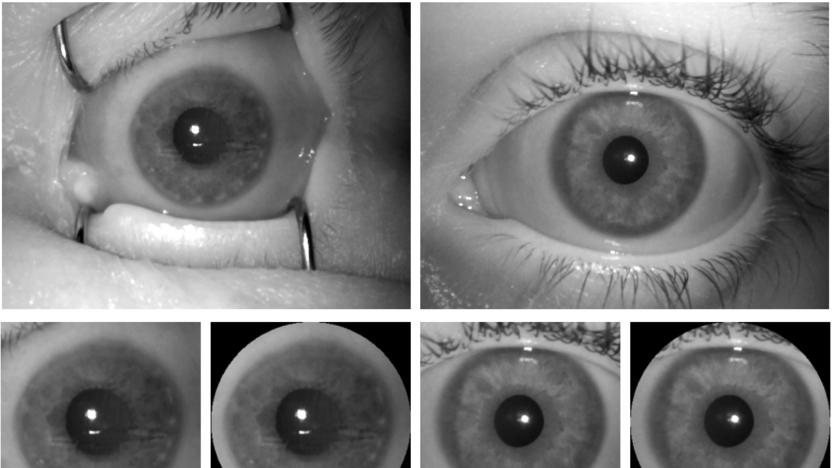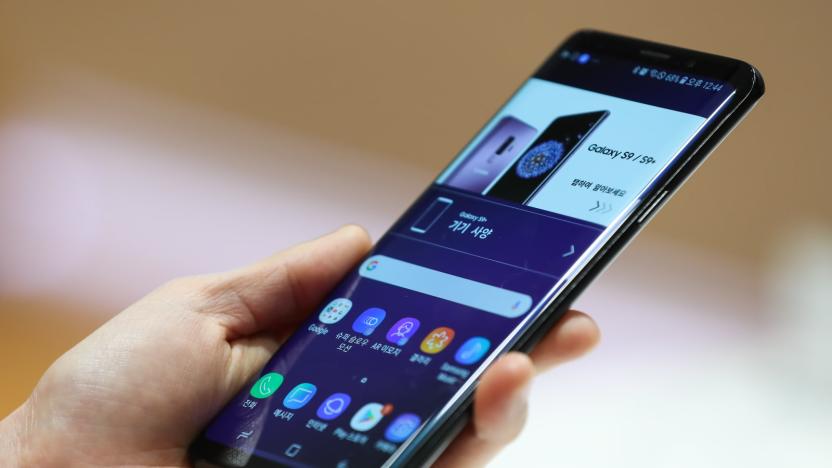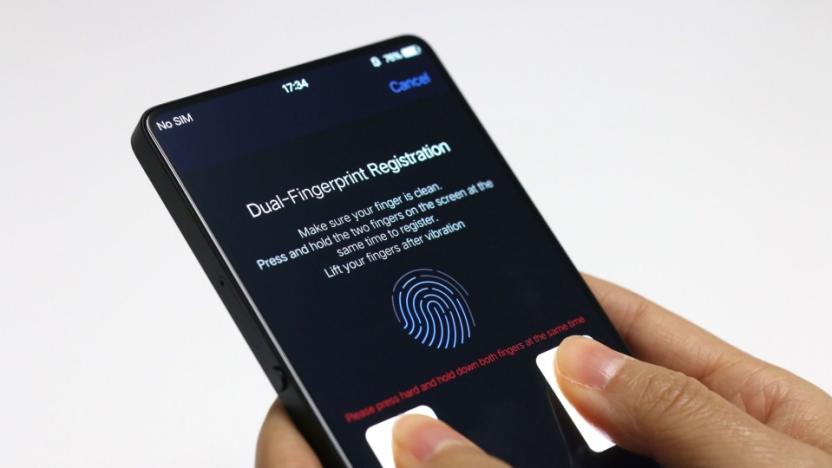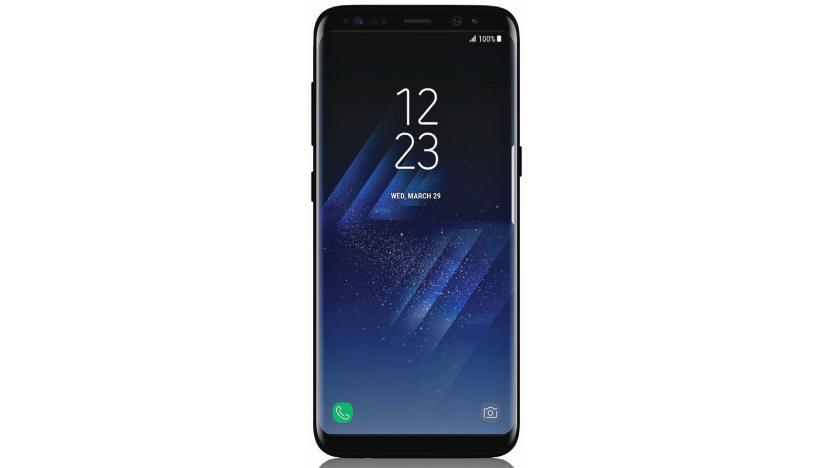irisscanner
Latest

Iris scanner AI can tell the difference between the living and the dead
It's possible to use a dead person's fingerprints to unlock a device, but could you get away with exploiting the dead using an iris scanner? Not if a team of Polish researchers have their way. They've developed a machine learning algorithm that can distinguish between the irises of dead and living people with 99 percent accuracy. The scientists trained their AI on a database of iris scans from various times after death (yes, that data exists) as well as samples of hundreds of living irises, and then pitted the system against eyes that hadn't been included in the training process.

Samsung's Galaxy S10 may include an in-display fingerprint reader
The Galaxy S9 may have been a modest evolution of its predecessor, but you might not get to level that accusation against the S10. Korean financial news outlet The Bell claims that the Galaxy S10 (codenamed "Beyond") will include an in-display fingerprint reader similar to devices like the Oppo Find X or Vivo Nex. You wouldn't have to lift up your phone and hunt for the reader on the back. It's reportedly "considering" an iPhone X-style face recognition system at the same time, so you might even have a choice of cutting-edge biometric sign-ins.

The chaos of unlocking your phone in 2018
PIN codes and patterns are passe. MWC 2018 kicked off with the usual fanfare of a major flagship launch -- the Galaxy S9. With it, Samsung introduced its own, new, face unlock feature. Google may have added the feature to Android many years ago, but it seems technology has progressed enough to make it worth resurrecting by Samsung -- with some extra biometric backup. The House of Galaxy might have also felt the competitive tug of Apple's surprisingly slick Face ID unlock feature on the iPhone X. Samsung wasn't the only company innovating when it comes to how we get our smartphone working. And it's not just the thousand-dollar flagships, either. Biometrics are here in a big way, although no-one seems to know which method's best. How many of these techniques will last to see 2020?

Samsung Galaxy S9 may pack more reliable face recognition
Samsung has hinted that the Galaxy S9 might include more advanced face recognition, but we're now getting clues as to what's involved. SamCentral's sleuthing in the settings APK for the Galaxy Note 8's Oreo beta has discovered a hidden Intelligent Scan feature that uses both camera-based face detection and the iris scanner in tandem for "better accuracy and security" and improved results in "low or very bright" lighting. Given that the iris scanning on the S8 and Note 8 can be finnicky, this could deliver a much more consistent experience when you're unlocking your phone or accessing secure info.

Dubai airport will scan your face as you walk through a video tunnel
A lot of passengers come and go through Dubai airports and by 2020, they're expected to play host to some 124 million people. So in an effort to increase the efficiency of security checkpoints, Dubai International Airport is installing a tunnel outfitted with 80 facial recognition and iris scanning cameras, The National reports. The tunnel's walls can display things like virtual aquariums or deserts as well as advertisements and passengers would just have to walk through as they normally would. At the end of the tunnel, a display will either tell the passenger to have a nice trip or will alert officials to take another look.

The Galaxy S8 iris scanner can be hacked with aging tech
Biometrics are becoming our next de facto security measure, and they're supposed to be a vast improvement on easily-forgotten and hackable passwords. Yet a point-and-shoot camera, laser printer and contact lens is all it took for German hacking group Chaos Computer Club to crack the Samsung Galaxy S8's iris scanner. "By far [the] most expensive part of the iris biometry hack was the purchase of the Galaxy S8," the group wrote on its website. They pulled it off by taking a photo of the target from about five meters away, and printing a close-up of the eye on a laser printer — made by Samsung, no less. A regular contact lens was placed on top of the print to replicate the curve of an eyeball. When the print was held up to the smartphone, the S8 unlocked.

The Galaxy S8 may use your face for secure mobile payments
Facial recognition is a done thing. So are contactless payments. So why not put them together? Samsung might do just that according to Bloomberg sources. The incoming Galaxy S8 will reportedly feature facial recognition payment tech "within months of release" in a bid to stand out (and grab those feature headlines) in a world where lots of us are plenty happy with our current smartphones.

Samsung Pass will give you secure banking via an iris scan
At Samsung's Unpacked 2016 event, the company revealed that its Galaxy Note 7 will have a futuristic new way to sign in: an iris scanner. It'll do much more than just unlock your phone, though. The Korean company also revealed Samsung Pass, a new security system that will let you access banking and other chores using your eyeballs. Samsung says that it's working with Bank of America, Citibank, US Bank and other firms on the new tech.

AOptix e-Gate could improve global airport security, replace ID checks with iris scans
You're certainly not alone if you think that the current airport security process is far from ideal. AOptix hopes to streamline and speed up security procedures by replacing manual boarding pass and ID checks with a biometric kiosk called e-Gate. The new system, which verifies passenger identities by matching an iris scan with a boarding pass, just received (IATA) approval, and is currently being tested in three airports around the world. It's not as slick as a similar concept we saw earlier this summer, but e-Gate could be implemented with a trusted traveler program, creating special lanes for pre-approved frequent fliers -- similar to the US Customs Global Entry system in place today. We don't see it replacing X-ray machines and check-in interviews, but it could remove human error from the equation -- at least when it comes to verifying your identity. Jump past the break for the full scoop from AOptix, or you can check out the system for yourself at the Future Travel Experience in Vancouver. Update: e-Gate is in fact a potential component of Checkpoint of the Future, which we saw conceptualized in June.%Gallery-133007%

IATA's Checkpoint of the Future uses biometric IDs to separate do-gooders from terrorists (video)
This, ladies and gentlemen, could be your Checkpoint of the Future -- a new airport security prototype that promises to move away "from a system that looks for bad objects, to one that can find bad people." Unveiled at the IATA's annual conference in Singapore yesterday, the setup is comprised of three, 20-foot long detectors -- one for "known travelers," one for high-risk flyers, and one for everyone else. Instead of funneling passengers through the same checkpoint, then, the prototype would use eye scanners and biometric chips to verify their identities and analyze their personal history, before dividing them into groups. People who complete and pass government background checks would waltz through the fast pass lane with their carry-on luggage in tow, whereas those deemed particularly risky would have to undergo a more intensive, full-body scan within the "Enhanced" security lane. The rest of us, meanwhile, would be directed to the "Normal" detector, which would automatically scan us for liquids, metals and everything that is evil. The IATA says this risk-based approach would reduce security lines and lower airport costs, but it would still require governments to share data on their own citizens, which could pose a major hurdle to widespread adoption. For now, the IATA and governmental agencies are still hammering away at the details and have yet to announce a pilot program, but you can check out an audio-less demo video of the prototype, after the break.

Leon, Mexico to use biometric scanners in 'all aspects of life'
First it was CCTV surveillance, and now a Mexican security firm called Portoss is teaming up with biometrics manufacturer Global Rainmakers, Inc., to make the city of Leon in Guanajuato the most potentially oppressive in the world. The secure city initiative will provide "unparalleled iris identity fusion" by wrapping the city in miles of fiber optic cable, creating a central database that will contain of all convicted criminals (as well as any good citizens who wish to "opt in"), and a network of iris scanners. As you can imagine, the man in charge of selling this stuff -- Global Rainmakers CDO Jeff Carter -- is something of a "true believer." Fast Company attributes the following quote to him: "Every person, place, and thing on this planet will be connected [to the iris system] within the next 10 years." Great! There's also this one: "If you've been convicted of a crime, in essence, this will act as a digital scarlet letter. If you're a known shoplifter, for example, you won't be able to go into a store without being flagged. For others, boarding a plane will be impossible." And how about embittered bloggers? Will we be prevented from accessing the Internet to point out how unbelievably frightening this is? PR after the break.

Panasonic develops walkthrough iris scanner to hasten ID checks
Snappy retinal scanners have been in the works for some time, and now Panasonic is apparently hoping to hasten those annoying ID checks by enabling security personnel to confirm the true identity of a person walking through in just "two seconds." Additionally, this scanner does not require subjects to "focus on the equipment," packs "multiple two-megapixel cameras," and in case you couldn't guess, is being marketed towards airports and high-security office buildings. No word just yet on when these may be rolled out for public use, but anything (well, almost) that speeds up our traveling is smiled upon by us.[Via TechDigest]

Qritek intros iris-recognizing IRIBIO mouse
If a mouse with a built-in fingerprint reader isn't enough to calm your security concerns, you may want to give Qritek's latest peripheral some consideration, which ups the biometric game by packing its own iris scanner. Apparently, the company's IRIBIO mouse can not only be used to control acccess to a PC, but to specific files as well -- presumably, there's also some sort of software measures involved to prevent people from simply swapping out the mouse for less security-minded one. While it may have the biometric advantage over standard mice, it certainly doesn't stand out when it comes to other mouse features, boasting an unremarkable 600 dpi resolution along with the standard two buttons and a scroll wheel. Only the most cautious/paranoid need apply here through, as the cost for this particular extra piece of mind is a hefty ¥37,800, or $315.[Via Plastic Bamboo]

MIT researchers develop speedy retina scanner to diagnose ocular diseases
Although the mere mention of "retinal scanner" may get the blood boiling in privacy advocates, the latest such device out of MIT sports a much more innocent soul. Researchers at the school have reportedly developed a method to "scan the retina at record speeds of up to 236,000 lines per second, or ten-times faster than current technology." This process will allow doctors to snap "high detailed 3D images of the eye," which can be used to non-invasively spot ocular diseases such as diabetic retinopathy, glaucoma, and age-related macular degeneration much earlier and more accurately. The process itself is dubbed optical coherence tomography (OCT), and while things seem to moving along as scheduled, it will still be "five years or more" before we see this thing commercialized.[Via MedLaunches]

Sarnoff wants to scan your iris without your knowledge
Okay, so it's more like the US government wanting to snag shots of your eyeballs sans your knowledge, but still, Sarnoff Corporation (yet another New Jersey firm interested in ocular studies) has recently filed a patent application that spells out a snazzy method of quickly photographing a helpless individual's facial region multiple times in order to (hopefully) capture one solid look at the iris. This newfangled manner of jacking biometrics from clueless pedestrians is actually being requested by the American government, as it apparently hopes to use it to run constant background checks with the information on file in order to peg a threat as they're strolling through. The device is slated to beam a "powerful, infrared strobe light" onto the subjects' faces, which syncs up with the camera exposures and creates a bank of hopeful photos for each individual, presumably chewing through terabytes of hard drive space in the process. Regardless, even this tactical approach probably won't be effective for long -- you know, considering every potential baddie now knows to rock the welder's glasses from here on out.[Via ]

Maine Sheriff's Department building kids iris database
Looks like the Penobscot County Sheriff's Department in Maine is the latest to get in the biometrics game, investing in an iris scanner and setting out to scan and record the vitals of all the children in the area. The department's not just freelancing here though, with each kid's biometric information being contributed to the nationwide Children's Identification and Location Database (or CHILD) project, intended to aid in locating and identifying missing children. While it has already scanned some 500 kids' eyes, the Sheriff's Department is now looking to speed up the process by bringing the technology into schools to register 'em all in one fell swoop. Of course, similar programs haven't always been met well by privacy-conscious parents in the past, but the department looks to be trying to accommodate any concerns by first sending home a permission slip with the students that parents must sign off on. While this scan is strictly a one time deal, at the rate various biometric systems are moving into schools, we somehow suspect that it won't be the last encounter the students have with the technology in the course of their edification.

Your cameraphone -- an iris scanner
Japanese company Oki Electric has announced it is working on technology to turn any cameraphone or camera-equipped PDA into an iris scanner. Able to differentiate between photograph and actual eyes, and boasting an accuracy of 1 error in 100,000 scans, Oki hopes this will improve the security of cellphone payment systems. Though, you will have to wait until March of next year to get your James Bond on; and do watch out for Wesley Snipes, we hear dude's got a thing for gouging.








